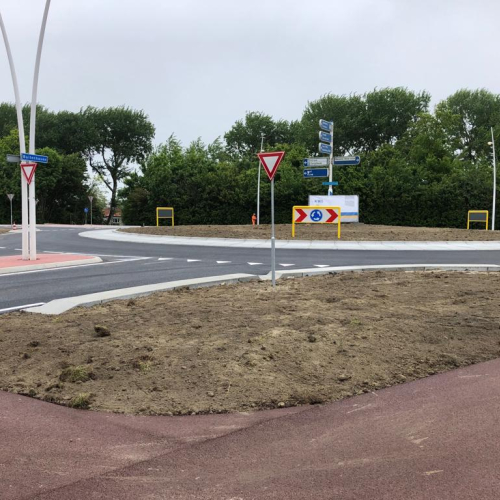KWS builds circular prefab roundabout in single weekend
Last weekend KWS took just one weekend to build a roundabout on Binnenvaartweg in the southern Dutch town of Terneuzen. The use of prefab, modular concrete elements allows the traditional construction period of six weeks to be reduced to a single weekend. The circular elements can easily be moved to a different location and reused throughout their lifetime. Late afternoon on Friday Terneuzen councillor Ben van Assche gave the official starting signal for the work and at 6 o’clock on Monday morning the roundabout was opened to traffic. This is the second entirely prefab roundabout – or ‘Protonde’ – KWS has built in the Netherlands.

Prefab, modular and circular
Using mainly prefab elements to build the roundabout on Binnenvaartweg not only cut costs but also meant that the roundabout could be realised much quicker than using traditional methods. During their lifespan the elements can easily be moved to another roundabout, for example if an existing roundabout is eliminated. It also allows for the refurbishment of the roundabout, thus extending its lifespan. Thanks to the short construction period and circularity of the elements the roundabout is more sustainable than the traditional variety.
Protonde prefab roundabout
The initiators of the Protonde concept – KWS, Leicon Verkeersgeleiding and RvB Groep – installed the first prefab roundabout in Ermelo in September 2017. The prefab roundabout in Terneuzen is a hybrid variation on the concept: whilst in Ermelo prefab elements were used for both the rumble strip and the driving lanes, in Terneuzen it was decided to use asphalt for the driving lanes. Furthermore, in this second Protonde, prefab elements were used for the connections including the central reservations, a further development of the concept which significantly reduces the number of actions, thus further shortening the construction time.
Less disruption
Building a traditional roundabout normally takes about six weeks. It involves setting up diversions: temporary lanes to guide through traffic around the work area. Because most of the sections of the roundabout on Binnenvaartweg were supplied as prefab elements the road only needed to be closed for the duration of the assembly process. As a result disruption to traffic was limited to just one weekend: from 6pm on Friday to 6am on Monday. This approach also reduces the amount of extra carbon dioxide emitted as a result of diversions.
With the delivery of this Protonde roundabout KWS Infra Roosendaal-Sas van Gent has made the traffic situation in the municipality of Terneuzen safer using an alternative to traditional roundabouts that is both faster and more sustainable.